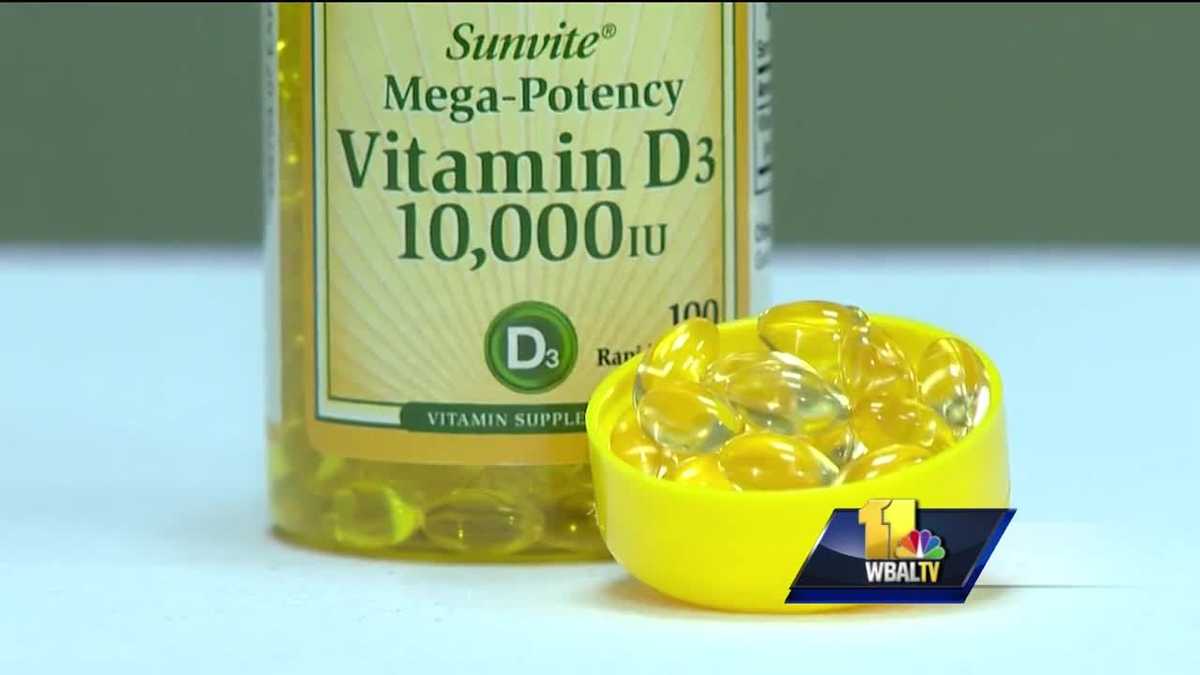WEEK, JUST IN TIME FOR THE 4TH OF JULY. WELL, IN THIS MORNING’S WOMAN’S DOCTOR, WE ALL GET VITAMIN D FROM BEING IN THE SUN, BUT HOW MUCH DO WOMEN REALLY NEED? WOMEN AGES 30 TO 70 NEED ABOUT 600 INTERNATIONAL UNITS. AND ONCE YOU’RE OVER 70, THAT NUMBER GOES UP TO ABOUT 800. MERCY MEDICAL CENTER DOCTOR ERNESTINE WRIGHT SAYS THAT YOU CAN ALSO GET VITAMIN D FROM FOODS LIKE MILK, JUICES, SOME FISH AND CEREAL, JUST TO NAME A FEW ITEMS. BUT IF YOU DON’T SPEND TIME OUTSIDE AND YOU ALSO DON’T EAT FOODS THAT HAVE VITAMIN D IN THEM, THAT’S WHEN YOU MAY WANT TO LOOK INTO SUPPLEMENTS. MOST ONE-A-DAY VITAMINS HAVE 800 INTERNATIONAL UNITS OF VITAMIN D, SO IF YOU EAT A BALANCED DIET AND YOU ARE OUT IN THE SUN, THEN YOU DO HAVE ENOUGH. BUT IF YOUR BASELINE LEVELS ARE LOW, AND MY EXPERIENCE IS THAT MOST WOMEN. POST-MENOPAUSAL HAVE LOW VITAMIN D LEVELS. SO FOR MOST OF THOSE WOMEN, IF THEY’RE ON A MULTIVITAMIN, THEY USUALLY NEED TO TAKE AN EXTRA DOSE OF VITAMIN D3 JUST 1000MG TO GET THE VITAMIN D LEVELS TO THE RANGE OF BETWEEN 30 AND 65, WHICH IS WHAT WE’RE AIMING FOR. VITAMIN D HELPS WITH YOUR BONE HEALTH, AS WELL AS BOOST YOUR IMMUNE SYSTEM. IF YOUR VITAMIN D LEVEL IS TOO LOW, DOCTOR WRIGHT SAYS, YOU MAY FEEL REALLY TIRED AND HAVE NO ENERGY, AND YOU CAN GET TOO MUCH VITAMIN D THAT’S CALLED VITAMIN D TOXICITY. AND WITH THIS CONDITION, DOCTOR WRIGHT SAYS, YOU MAY FEEL NAUSEOUS AND EVEN EXPERIENCE VOMITING. SHE SAYS IT CAN ALSO INCREASE YOUR RISK OF KIDNEY STONES, SO MAKE SURE
Woman’s Doctor: How much vitamin D do women need over time

Updated: 10:06 AM EDT Jul 1, 2025
Vitamin D is commonly absorbed into the body from sunlight, but how much do women really need?Women between ages of 30 and 70 need about 600 international units, and once they’re over 70, that number goes up to about 800 IU.Mercy Medical Center’s Dr. Ernestine Wright said people can also get vitamin D from food, like milk, juices, some fish and cereal, to name a few items. For people who don’t spend much time outside and don’t eat foods that contain vitamin D, they may want to consider taking supplements.”Most one-a-day vitamins have 800 international units of vitamin D. So, if you eat a balanced diet and you and you are out in the sun, then you do have enough,” Wright told 11 News. “But if your baseline levels are low — and my experience is that most post-menopausal women have low vitamin D levels — most of those women, if they’re on a multivitamin, they usually need to take an extra dose of vitamin D3, just 1000 mg, to get their vitamin D levels to the range of between 30 and 65, which is what we’re aiming for.”Vitamin D helps with bone health, as well as boosts the immune system. If the vitamin D level is too low, Wright said people may feel really tired and have no energy.On the other end, people can get too much vitamin D, which is called vitamin D toxicity. With this condition, Wright said people may feel nauseous and even experience vomiting. She said it can also increase your risk of kidney stones, so make sure to get checked regularly by a doctor.
BALTIMORE —
Vitamin D is commonly absorbed into the body from sunlight, but how much do women really need?
Women between ages of 30 and 70 need about 600 international units, and once they’re over 70, that number goes up to about 800 IU.
Mercy Medical Center’s Dr. Ernestine Wright said people can also get vitamin D from food, like milk, juices, some fish and cereal, to name a few items. For people who don’t spend much time outside and don’t eat foods that contain vitamin D, they may want to consider taking supplements.
“Most one-a-day vitamins have 800 international units of vitamin D. So, if you eat a balanced diet and you and you are out in the sun, then you do have enough,” Wright told 11 News. “But if your baseline levels are low — and my experience is that most post-menopausal women have low vitamin D levels — most of those women, if they’re on a multivitamin, they usually need to take an extra dose of vitamin D3, just 1000 mg, to get their vitamin D levels to the range of between 30 and 65, which is what we’re aiming for.”
Vitamin D helps with bone health, as well as boosts the immune system. If the vitamin D level is too low, Wright said people may feel really tired and have no energy.
On the other end, people can get too much vitamin D, which is called vitamin D toxicity. With this condition, Wright said people may feel nauseous and even experience vomiting. She said it can also increase your risk of kidney stones, so make sure to get checked regularly by a doctor.
